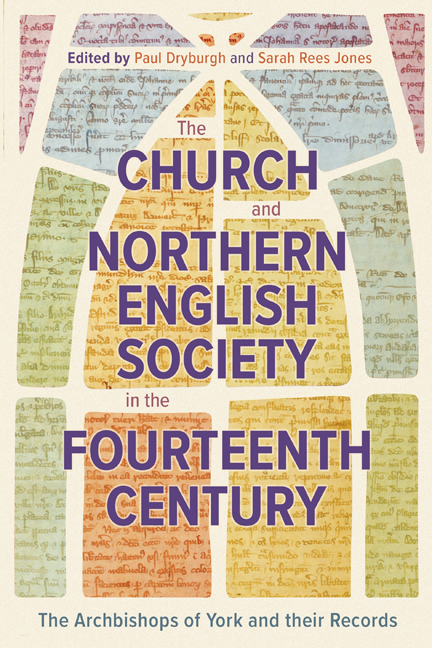 The Church and Northern English Society in the Fourteenth Century
The Church and Northern English Society in the Fourteenth Century Book contents
- Frontmatter
- Dedication
- Contents
- List of Illustrations
- List of Contributors
- Acknowledgements
- List of Abbreviations
- Map: The Ecclesiastical Province of York, c. 1304–1405
- Introduction
- 1 The Administrative Records of the Archbishops of York, 1304–1405
- 2 The Archbishops of York and the Government of Fourteenth-Century England
- 3 Support or Scourge? Archbishop William Melton and the Tradition of Loyal Opposition to the English
- 4 Beyond the Border: The Influence of York Clerks in the Two Edwards’ Scottish Administrations, 1332–1357
- 5 Responding to Royal Requirements: Clerical Taxation in the Province of York, 1304–1405
- 6 Ad insolenciam ipsius rebellis salubrius reprimendam: William Thorntoft, the Abbey of Rufford and Significations of Excommunication in the Northern Province
- 7 Blood, Sex and Holy Water: Reconciling Churches and Churchyards in the Medieval Diocese of York
- 8 Structuring Episcopal Authority: Palaces and Residences of the Archbishop of York
- 9 Medieval Parks of the Archbishops of York
- 10 Northern Ways? Pilgrimage, Politics and Piety in the Fourteenth-Century Administrative Records of the Archdiocese of York
- 11 Underexplored Sources for Gender History: New Approaches to the Fourteenth-Century York Archbishops’ Registers
- 12 Joan of Leeds and other Apostate Nuns in the Province of York, 1300–1350
- Bibliography of Records of the Archbishops of York, 1304–1405
- Index
2 - The Archbishops of York and the Government of Fourteenth-Century England
Published online by Cambridge University Press: 17 May 2024
- Frontmatter
- Dedication
- Contents
- List of Illustrations
- List of Contributors
- Acknowledgements
- List of Abbreviations
- Map: The Ecclesiastical Province of York, c. 1304–1405
- Introduction
- 1 The Administrative Records of the Archbishops of York, 1304–1405
- 2 The Archbishops of York and the Government of Fourteenth-Century England
- 3 Support or Scourge? Archbishop William Melton and the Tradition of Loyal Opposition to the English
- 4 Beyond the Border: The Influence of York Clerks in the Two Edwards’ Scottish Administrations, 1332–1357
- 5 Responding to Royal Requirements: Clerical Taxation in the Province of York, 1304–1405
- 6 Ad insolenciam ipsius rebellis salubrius reprimendam: William Thorntoft, the Abbey of Rufford and Significations of Excommunication in the Northern Province
- 7 Blood, Sex and Holy Water: Reconciling Churches and Churchyards in the Medieval Diocese of York
- 8 Structuring Episcopal Authority: Palaces and Residences of the Archbishop of York
- 9 Medieval Parks of the Archbishops of York
- 10 Northern Ways? Pilgrimage, Politics and Piety in the Fourteenth-Century Administrative Records of the Archdiocese of York
- 11 Underexplored Sources for Gender History: New Approaches to the Fourteenth-Century York Archbishops’ Registers
- 12 Joan of Leeds and other Apostate Nuns in the Province of York, 1300–1350
- Bibliography of Records of the Archbishops of York, 1304–1405
- Index
Summary
The eight fourteenth-century archbishops from William Greenfield (1306– 15) to Richard Scrope (1398–1405) were conspicuous in their service to the Crown and, often, the person of the king. They occupied senior administrative posts in the secretarial and financial departments of government – principally the Chancery, Exchequer and royal Wardrobe – over long periods, before their elevation to the archiepiscopate and thereafter. Embroilment in secular government and finance was controversial. Service to the Crown and membership ex officio of the royal Council could impinge drastically on a senior churchman's time and dedication to spiritual and pastoral care in his diocese. Archbishop John Thoresby (1353–73), for example, did not take up residence in York until 1356, almost three years after his preferment, while serving as Edward III's chancellor at the height of his successful continental campaigns; Thoresby left his diocese to the care of his vicar-general Master Thomas de Bucton in the interim. Deputisation of many official duties, particularly while in active governmental service, was naturally a keystone of the efficient functioning of royal administration, and, to some extent, politic in this period, as Sarah Rees Jones outlines in her chapter in this volume. Nonetheless, convocations often decried clerical involvement in secular politics, and John Wyclif predicated some of his criticism of the established Church on the ecclesiastical hierarchy, famously questioning, ‘What on earth is an archbishop doing as the king's chancellor, an office which is the most secular in the kingdom?’5 For Wyclif it should have been impossible to serve a secular as well as the spiritual master. Whether deliberately or not, however, Wyclif overlooked the fact that the chancellorship had distinct ecclesiastical responsibilities: as well as keeping the great seal, the primary means of communicating and authenticating royal will across a wealth of business, the chancellor acted as overseer and approver of the elections of heads of religious houses; he also visited all royal hospitals and free chapels; and he presented to all benefices valued at twenty marks or less that were in the king's gift, a not insignificant bolt in an otherwise bulging quiver of patronage.
- Type
- Chapter
- Information
- The Church and Northern English Society in the Fourteenth CenturyThe Archbishops of York and their Records, pp. 80 - 108Publisher: Boydell & BrewerPrint publication year: 2024


